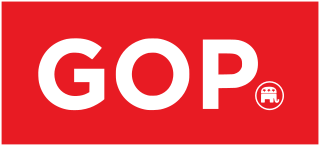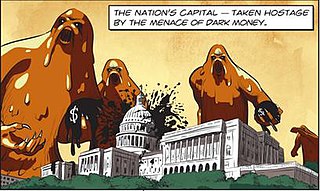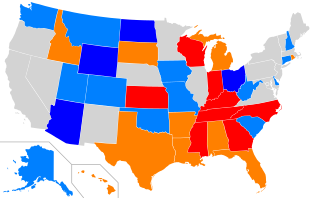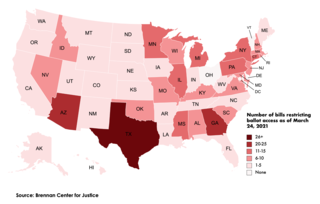Lawrence D. Norden (born in Manhattan) [1] is the Senior Director of the Elections and Government Program at the Brennan Center for Justice at New York University School of Law.
Lawrence D. Norden (born in Manhattan) [1] is the Senior Director of the Elections and Government Program at the Brennan Center for Justice at New York University School of Law.
The son of a high school math teacher and an accountant, Norden majored in American history at the University of Chicago, after which he attended New York University School of Law. [1] Prior to working at the Brennan Center, he worked as a corporate litigator at Stroock & Stroock & Lavan and as a bankruptcy lawyer at Hahn & Hessen. [1]
As a senior director for the Brennan Center for Justice, Norden is known for his research on voting machines and other election infrastructure in the United States. [2] For example, a 2011 study by Norden found that as many as 60,000 votes cast in New York elections in 2010 were invalid because when casting them, the voters accidentally voted for multiple candidates, a problem the study attributed to both software errors and ambiguous instructions. [3] In 2013, he told NPR that one in eight voter registration records is inaccurate, and that because registration "doesn't follow people when they move, even though a lot of people think it does," poll workers cannot find the names of some voters on election day. [4]
Norden has argued that six decisions by the Roberts Supreme Court have transformed the way American political campaigns are funded, largely for the worse. [5] He expressed concern about the increased amount of dark money spent on the 2014 midterm elections, which he attributes, in part, to the Supreme Court's Citizens United decision. [6] He has advocated for requiring government contractors to disclose political spending [7] and tax credits for small campaign donations to increase the political participation and voice of average citizens. [8]

The Republican Party, also referred to as the GOP, is one of the two major, contemporary political parties in the United States, along with its main historic rival, the Democratic Party.
In electoral systems, voter registration is the requirement that a person otherwise eligible to vote must register on an electoral roll, which is usually a prerequisite for being entitled or permitted to vote. The rules governing registration vary between jurisdictions. In most jurisdictions, voting and registration is optional, while in others registration and voting are compulsory for citizens of voting age.

Voter suppression is a strategy used to influence the outcome of an election by discouraging or preventing specific groups of people from voting. It is distinguished from political campaigning in that campaigning attempts to change likely voting behavior by changing the opinions of potential voters through persuasion and organization, activating otherwise inactive voters, or registering new supporters. Voter suppression, instead, attempts to reduce the number of voters who might vote against a candidate or proposition.
During the 2004 United States elections, concerns were raised about various aspects of the voting process, including whether voting had been made accessible to all those entitled to vote, whether ineligible voters were registered, whether voters were registered multiple times, and whether the votes cast had been correctly counted. More controversial was the charge that these issues might have affected the reported outcome of the presidential election, in which the incumbent, Republican President George W. Bush, defeated the Democratic challenger, Senator John Kerry. Despite the existing controversies, Kerry conceded the election the following day on November 3.
Rasmussen Reports is an American conservative polling company founded in 2003. The company engages in political commentary and the collection, publication, and distribution of public opinion polling information. Rasmussen Reports conducts nightly tracking, at national and state levels, of elections, politics, current events, consumer confidence, business topics, and the United States president's job approval ratings.

Voter registration in the United States is required for voting in federal, state and local elections in the United States. The only exception is North Dakota, although cities in North Dakota may register voters for city elections. Voter registration takes place at the county level in many states and at the municipal level in several states. Most states set cutoff dates for voter registration and to update details, ranging from 2 to 4 weeks before an election; while a third of states have Election Day or "same-day" voter registration which enables eligible citizens to register or update their registration when they vote before or on election day.
The Brennan Center for Justice at New York University Law School is a nonprofit law and public policy institute generally considered liberal or progressive in its policy positions and views. The organization is named after Supreme Court Justice William J. Brennan.

Brian Porter Kemp is an American businessman and politician serving as the 83rd governor of Georgia since January 2019. A Republican, he was the 27th secretary of state of Georgia from 2010 to 2018 and a member of the Georgia State Senate from 2003 until 2007.

The 2014 United States elections were held on Tuesday, November 4, 2014, in the middle of Democratic President Barack Obama's second term. Republicans retained control of the House of Representatives and won control of the Senate.

In the politics of the United States, dark money refers to political spending by nonprofit organizations—for example, 501(c)(4) 501(c)(5) (unions) and 501(c)(6) groups—that are not required to disclose their donors. Such organizations can receive unlimited donations from corporations, individuals and unions. In this way, their donors can spend funds to influence elections, without voters knowing where the money came from. Dark money first entered politics with Buckley v. Valeo (1976) when the United States Supreme Court laid out Eight Magic Words that define the difference between electioneering and issue advocacy.

Voter ID laws in the United States are laws that require a person to provide some form of official identification before they are permitted to register to vote, receive a ballot for an election, or to actually vote in elections in the United States.
Shelby County v. Holder, 570 U.S. 529 (2013), was a landmark decision of the US Supreme Court regarding the constitutionality of two provisions of the Voting Rights Act of 1965: Section 5, which requires certain states and local governments to obtain federal preclearance before implementing any changes to their voting laws or practices; and Section 4(b), which contains the coverage formula that determines which jurisdictions are subject to preclearance based on their histories of discrimination in voting.
Voter suppression in the United States is various legal and illegal efforts to prevent eligible voters from exercising their right to vote. Where found, such voter suppression efforts vary by state, local government, precinct, and election. Separately, there have also been various efforts to enfranchise and disenfranchise various voters in the country, which concern whether or not people are eligible to vote in the first place.

The Election Commission of India (ECI) is an autonomous body under the ownership of Ministry of Law and Justice, Government of India. It is established by the Constitution of India directly to ensure free and fair elections in the country. Article 324 of the Constitution provides that the power of superintendence, direction, and control of elections to parliament, state legislatures, the office of the president of India, and the office of vice-president of India shall be vested in the election commission. Thus, the Election Commission is an all-India body in the sense that it is common to both the Central government and the state governments.
Justin Levitt is an American constitutional law scholar and professor at Loyola Law School. In September 2015, he left Loyola Law School to become the Deputy Assistant Attorney General in the United States Department of Justice Civil Rights Division. He returned to the faculty of Loyola until early 2017.

The Presidential Advisory Commission on Election Integrity, also called the Voter Fraud Commission, was a Presidential Commission established by Donald Trump that ran from May 11, 2017 to January 3, 2018. The Trump administration said the commission would review claims of voter fraud, improper registration, and voter suppression. The establishment of the commission followed Trump's false claim that millions of illegal immigrants had voted in the 2016 presidential election, costing him the popular vote. Vice President Mike Pence was chosen as chair of the commission and Kansas Secretary of State Kris Kobach was its vice chair and day-to-day administrator.

The 2020 United States presidential election in Wyoming was held on Tuesday, November 3, 2020, as part of the 2020 United States presidential election in which all 50 states and the District of Columbia participated. Wyoming voters chose electors to represent them in the Electoral College via a popular vote, pitting the Republican Party's nominee, incumbent President Donald Trump and running mate Vice President Mike Pence, against Democratic Party nominee, former Vice President Joe Biden and his running mate California Senator Kamala Harris. Wyoming has three electoral votes in the Electoral College. Trump, the Republican nominee and incumbent president of the United States, won the state's three electoral votes.

The 2020 United States presidential election in Missouri was held on Tuesday, November 3, 2020, as part of the 2020 United States presidential election in which all 50 states plus the District of Columbia participated. Missouri voters chose electors to represent them in the Electoral College via a popular vote, pitting the Republican Party's nominee, incumbent President Donald Trump of Florida, and running mate Vice President Mike Pence of Indiana against Democratic Party nominee, former Vice President Joe Biden of Delaware, and his running mate Senator Kamala Harris of California. Missouri has 10 electoral votes in the Electoral College.

The For the People Act, introduced as H.R. 1, is a bill in the United States Congress to expand voting rights, change campaign finance laws to reduce the influence of money in politics, ban partisan gerrymandering, and create new ethics rules for federal officeholders.

Following the 2020 United States presidential election and attempts by Donald Trump and Republican officials to overturn it, Republican lawmakers initiated a sweeping effort to make voting laws more restrictive. According to the Brennan Center for Justice, as of October 4, 2021, more than 425 bills that would restrict voting access have been introduced in 49 states—with 33 of these bills enacted across 19 states so far. The bills are largely centered around limiting mail-in voting, strengthening voter ID laws, shortening early voting, eliminating automatic and same-day voter registration, curbing the use of ballot drop boxes, and allowing for increased purging of voter rolls. Republicans in at least eight states have also introduced bills that would give lawmakers greater power over election administration after they were unsuccessful in their attempts to overturn election results in swing states won by Democratic candidate Joe Biden in the 2020 election.